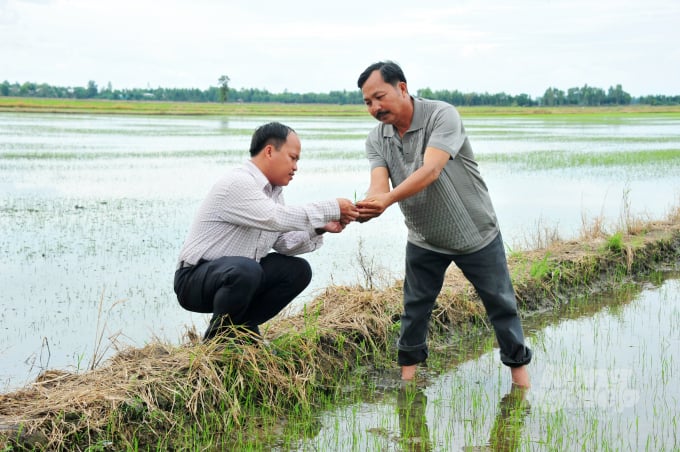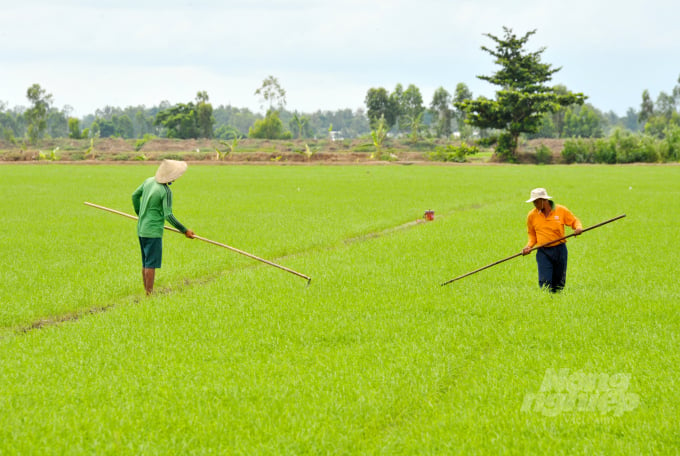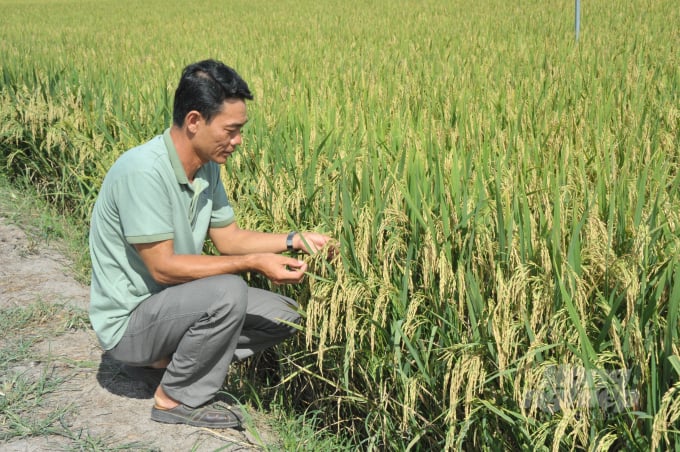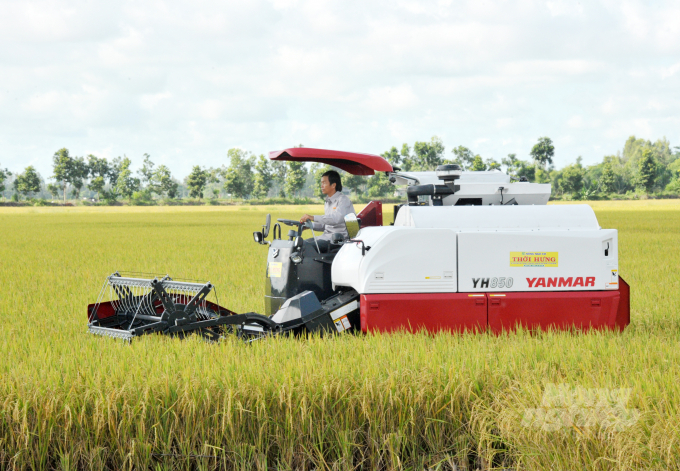May 21, 2025 | 03:20 GMT +7
May 21, 2025 | 03:20 GMT +7
Hotline: 0913.378.918
May 21, 2025 | 03:20 GMT +7
Hotline: 0913.378.918

Farmers apply SRP standards in rice production. Photo: Le Hoang Vu.
The Sustainable Rice Platform (SRP) is a global multi-stakeholder alliance established in 2011. Originally co‐convened by the International Rice Research Institute (IRRI), the United Nations Environment Programme (UNEP) and Deutsche Gesellschaft für Internationale Zusammenarbeit GmbH (GIZ), SRP is now an independent membership association.
SRP aims to transform the global rice sector by improving smallholder livelihoods, reducing the social, environmental and climate footprint of rice production and offering the global rice market an assured supply of sustainably produced rice to meet the growing global demand for rice.
SRP promotes resource-use efficiency and climate change resilience in rice systems (both on-farm and throughout value chains) and pursues voluntary market transformation initiatives by developing sustainable production standards, indicators, incentive mechanisms, and outreach mechanisms to boost wide-scale adoption of sustainable best practices throughout rice value chains.
Aiming for sustainable agricultural development, Loc Troi Group joined SRP in 2015. In the 2019-2020 winter-spring crop, the group continued to promote SRP by implementing the SRP model in two provinces of An Giang and Dong Thap. With the supports of the Loc Troi Group, all 13 farmers joining the model have their rice production met SRP standards. They are also the first farmers in the world to get such achievement.

In four consecutive seasons, farmers implementing the SRP model of Loc Troi Group continued to achieve 100 absolute points. Photo: Le Hoang Vu.
In four consecutive seasons, farmers implementing the SRP model of Loc Troi Group continued to achieve 100 absolute points, making Loc Troi Group the first and only unit in the world to make this achievement for 2 consecutive years.
The Agricultural Extension Station of Tri Ton District in An Giang built a demonstration model in the rice field of farmer Le Van Phuoc in Tan Thuan hamlet, Ta Danh commune in the last autumn-winter crop of 2020.
On an area of 2 hectares, Phuoc planted the OM18 rice variety. He was given seeds and fertilizers and was trained about the rice cultivation process relating to soil, fertilizer, pest control and farming diary.
Phuoc sowed 130kg of rice seed per ha, practising the use of pesticides with the "4 right" principle - right medicine, right dose and concentration, right time and the right way.
After 3 months of cultivation, the Agricultural Extension Station of Tri Ton District held a workshop to review and show the model to over 60 farmers and technicians in communes of Ta Danh, Tan Tuyen, Co To, Nui To and Tri Ton town.
After directly visiting the sustainable rice farming model applying the international standard SRP, many farmers were delighted to see that Phuoc's rice field was well developed with a sharply reduced cost.

Farmers save production costs when applying SRP standards. Photo: Le Hoang Vu.
Thanks to good seeds, the rice was healthy from the beginning of the crop. With reduced pest-relating pressure and balanced and reasonable fertilizer, rice was less prone to falling and diseases.
When applying farming SRP standards, Phuoc’s rice field required fewer seeds, fertilizers, pesticides, water for irrigation. He saw fewer post-harvest losses but productivity increase. As a result, he got a profit that was nearly VND4 million/ha higher than the control field.
Farmer Nguyen Van Hung, a member of Thang Loi cooperative in My Dong commune, Thap Muoi district (Dong Thap) for the first time applied rice farming SRP standards on his 2-ha-field.
Hung said he was worried as the technique is completely different from the production method that he has been doing for many years. However, at the end of the crop, he found the cost and labour were all reduced, but the productivity was higher than in the previous seasons.
Hung said that applying SRP standards in rice production helped farmers manage irrigation water, improve efficiency in the use of fertilizers and pesticides when applying integrated pest management (IPM) processes.
Rice adapted well to the current climate change conditions, he said, adding that the rice produced with SRP standards was sold at a higher price than usual.
Nguyen Duy Thuan, General Director of Loc Troi Group, said that from the winter-spring crop 2019-2020 until now, Loc Troi Group implemented the SRP models in two provinces of Dong Thap and An Giang. GlobalGap announced the models met all SRP standards.
“Thus, Loc Troi Group so far is the only unit in the world to achieve 100 perfect SRP points for 2 consecutive years 2020 – 2021,” he said.

Loc Troi Group so far is the only unit in the world to achieve 100 perfect SRP points for 2 consecutive years 2020 – 2021. Photo: Le Hoang Vu.
The International Rice Research Institute (IRRI) organized a training course "SRP Authorized Trainer" for 16 employees of the group. A total of 100 professional SRP instructors of Loc Troi Group are expected to help expand the SRP models shortly.
Up to now, Loc Troi Group has had 68 official SRP instructors who directly instruct farmers in the SRP models. This is the core force to deploy the 1 million-hectare raw material area of Loc Troi Group in line with the orientation of sustainable agricultural development, minimizing impacts on the environment and ensuring the livelihoods of local farmers in Vietnam.
Translated by Hien Anh

(VAN) Japan's grant aid project contributes to capacity building, promoting organic agricultural production, and fostering sustainable community development in Dong Thap province.

(VAN) For years, the CRISPR-Cas9 genome technology has been reshaping genetic engineering, a precision tool to transform everything from agriculture to medicine.

(VAN) Vietnam aims to become a 'leader' in the region in the capacity and managing effectively soil health and crop nutrition.
![Reducing emissions from rice fields: [Part 1] Farming clean rice together](https://t.ex-cdn.com/nongnghiepmoitruong.vn/608w/files/news/2025/05/05/z6509661417740_a647202949c539012a959e841c03e1d3-nongnghiep-143611.jpg)
(VAN) Growing clean rice helps reduce environmental pollution while increasing income, allowing farmers to feel secure in production and remain committed to their fields for the long term.
/2025/05/19/5136-1-144800_230.jpg)
(VAN) The Nghe An Provincial People's Committee has just approved the list of beneficiaries eligible for revenue from the Emission Reductions Payment Agreement (ERPA) in the North Central region for the year 2025.

(VAN) 14 out of 35 domesticated elephants in Dak Lak province have had their living conditions improved, with 11 of them currently participating in the non-riding elephant tourism model.

(VAN) Muong Nhe Nature Reserve hopes that being upgraded to a national park will lay the foundation for forest protection efforts to be carried out in a systematic, modern, and sustainable manner.